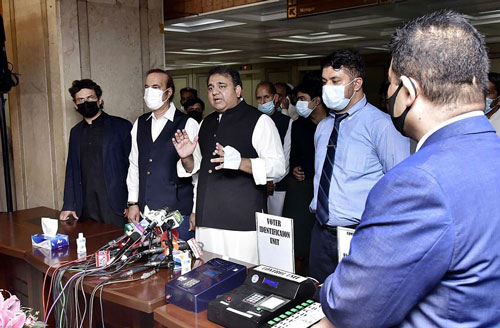Asks Opposition to inspect new model of machine
Staff Reporter Islamabad
Minister for Information and Broadcasting Fawad Chaudhry and Adviser to the Prime Minister on Parliamentary Affairs Babar Awan presented the prototype of an electronic voting machine (EVM) at the Parliament House on Wednesday.
Speaking to the media, Awan said that there are five proposed EVM models; three have been imported and two others are being manufactured in Pakistan, Radio Pakistan reported. He stated that the Election Commission of Pakistan will finalise the model of the machine.
Awan said that identification would be on the basis of the national ID card and it would be verified by data provided by the National Database and Registration Authority.
“Pakistan’s electoral system has been continuously plagued by a cancer,” said Awan, adding that no solution had been found through protests and speeches thus the prime minister had issued instructions after which this “treatment” was presented.
He stated that the prototype was also used in India to ensure transparency in the electoral process, while in Pakistan political parties refused to accept the results.
Awan cited the hue and cry by the PPP and PML-N in the NA-249 Karachi by-election where “both opposition parties called the other vote thieves”.
The information minister said that there would be two records created through this process: a paper record and an electronic record.
“Therefore, the result can’t be manipulated since a piece of paper will be printed in addition to it being recorded electronically.”
Chaudhry said that the system did not employ the use of the internet due to concerns of hacking.
“They’re 100 per cent standalone machines and they’re also not connected to each other so chances of rigging are further decreased.”
He declined to give an estimated cost of the EVMs since they hadn’t entered the commercial production phase.
Chaudhry stated that the machines would be simple to use, adding that “anyone who had used a mobile phone could use them”.
The information minister invited the Parliamentary Reporters Association, press clubs and bar associations to use the machines and said: “Create a consensus. If you are satisfied, we will use them. But if you are not satisfied then we won’t.”
He invited the opposition to come and inspect the new model and raise their concerns so that they can be addressed by the government.
“We are calling them for a serious debate. If they don’t come then the people should decide,” he said.
The information minister said that one major complaint was the length of time it took to compile and declare results, pointing to the Daska and Karachi by-elections, but now the result would be declared immediately.










